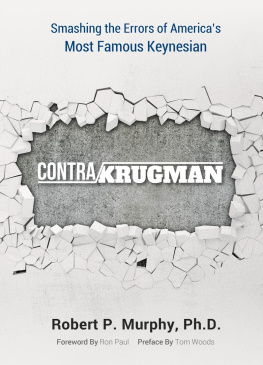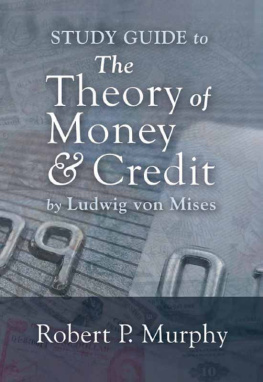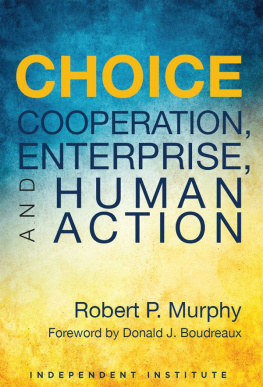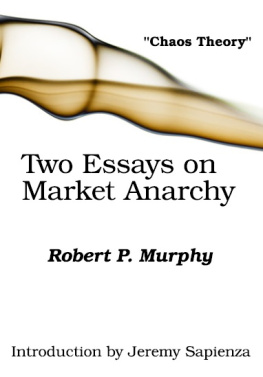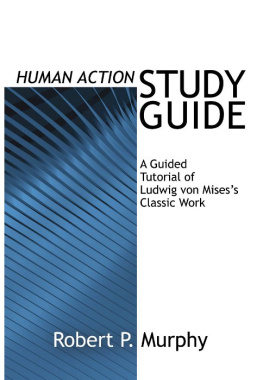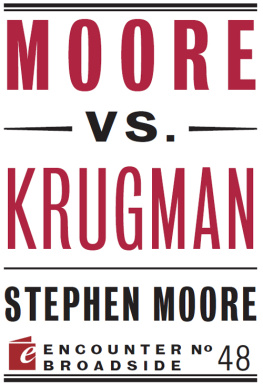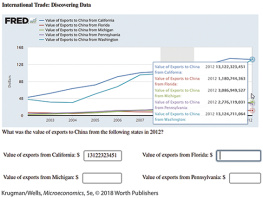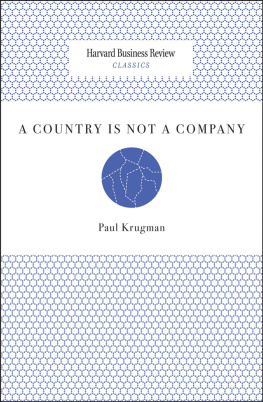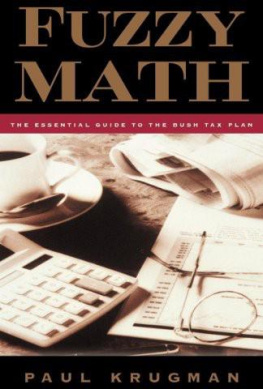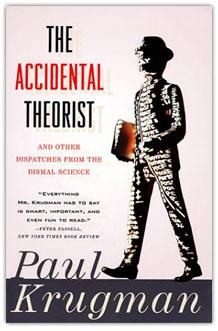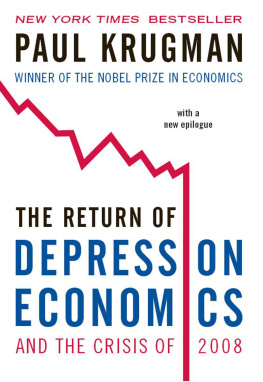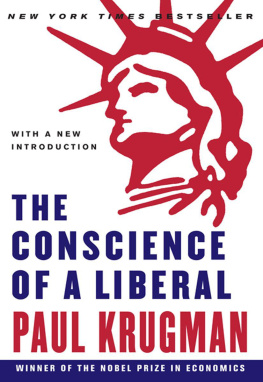Table of Contents
Copyright 2018 by Robert P. Murphy
All rights reserved. This book or any portion there of may not be reproduced or used in any manner without the express written permission of the publisher except for the use of brief quotations.
Printed in the United States of America
First Printing, 2018
ISBN-13: 978-1984126788
ISBN-10: 1984126784
1st edition printed March 2018 in the United States of America by
Sheridan Books, Inc., Ann Arbor, Michigan.
To contact the author, visit:
www.ConsultingByRPM.com
Foreword
I f there was a more prolific defender of the free market after the 2008 financial crisis than Bob Murphy, I dont know who it was.
During those crucial months, in which so many erstwhile supporters of the market economy defected to the Establishment, Bob refused to allow the conventional wisdom namely, that the crisis showed capitalism and deregulation didnt work to go unchallenged. Day after day he wrote articles and blog posts striking down common fallacies and providing the libertarian world with the intellectual ammunition to respond to a veritable avalanche of myth-making and error.
Of course, by virtue of his positions as a New York Times columnist and honorary chief Keynesian of the United States, Paul Krugman was responsible for much of the error Bob had to refute.
The scope of this book, however, extends well beyond the financial crisis. It covers stimulus spending, austerity, business cycles, financial reform, the Great Depression, debt, trade, climate change, employment and wages, monetary policy, the minimum wage, Obamacare, and more.
Ive been delighted to speak at numerous events alongside Bob over the years, and Im just as delighted to introduce this masterful collection to you. He is a tremendous asset to the liberty movement, and you will be glad to get to know his work.
Ron Paul
Lake Jackson, Texas
November 2017
Preface
P aul Krugman Nobel Prize winner, newspaper columnist, and destroyer of nations, as our podcast intro puts it is the face of American Keynesianism. Whether his colleagues like it or not, it is Krugman who has become the chief spokesman for the Keynesian worldview before the American public.
Thats why, in September 2015, Bob Murphy and I launched the weekly podcast Contra Krugman. Every week we refute one of Krugmans newspaper columns. Check it out at ContraKrugman.com.
Libertarians have rarely been much for strategy. Bob and I have smacked our heads more than once at critics who wonder why we give Krugman the time of day.
Gee, maybe because he has millions of readers, and fills their heads with destructive nonsense week after week?
No matter what Bob and I do, those millions will continue to be exposed to Krugmans ideas on a regular basis. How is the world a better place if his inanities go unanswered?
Meanwhile and heres the real point while dismantling Krugman we can be teaching economics to the general public. We can expose generic Republicans to the specific free-market tradition known as the Austrian School that venerable pedigree that boasts Carl Menger, Eugen von Bhm-Bawerk, Ludwig von Mises, F.A. Hayek, and Murray N. Rothbard. More people need to know about the Austrian School if future calamities are to be avoided. Such folks are unlikely to encounter the Austrian perspective in the pages of National Review or the Weekly Standard .
The podcast itself was my idea, but the brains of the operation are all Bobs. Bob became the undisputed master in this area: with an uncanny ability to recall Krugmans columns and blog posts from years past, he catches the New York Times columnist in contradictions or Kontradictions, Bobs special term for Krugmans habit of not quite contradicting himself, and giving himself just enough rhetorical wiggle room for a convoluted defense if he were ever called on it.
This book is a collection of many of Bobs critiques of Paul Krugman over the years. Were grateful to the Foundation for Economic Education (FEE), mises.org, mises.ca, and econlib.org for allowing these columns to be reproduced here.
The cumulative effect of this book is not only to reinforce how confused and downright wrong Krugman has been over the years, but also to remind the reader of just what a talented economist Bob Murphy is. Krugman and, more importantly, the school of economic ideas he represents is decimated.
Bobs online articles contained many references with embedded hyperlinks. We decided it would be too clunky to put them in this book as text, so we omitted them (with a few exceptions). At times Bob will say things like here and here where he is clearly hyperlinking to a source. For those readers who wish to read the link, its easy enough for you to simply Google the title of the chapter to find the original version online, where you can then find the link.
You will become more knowledgeable, a better economic thinker, and a more formidable debater after reading this book. If a book can deliver those three things, it gives you more than your moneys worth.
As youre about to discover, this one does.
Tom Woods
Harmony, Florida
November 2017
Part I

Stimulus
1
Does Depression Economics Change the Rules?
W ily competitors have known for ages that if you cant win the game, you can simply change the rules. Now, during normal economic times, if somebody recommended that the government borrow a trillion dollars and spend it on anything that moves, most economists (as well as common sense) would say, Thats nuts. So one would think that especially in the middle of a severe recession, in which the American public has to recover from misguided overconsumption (fueled by Fed policies), such massive deficit spending would be all the more ludicrous.
Ah, enter the wily academics. According to our most recent Nobel laureate, Paul Krugman, we are now in a period of depression economics, where the standard rules dont apply. In particular, the argument goes, when there are idle resources lying around, the traditional economic problem of scarcity disappears. The government can prime the pump by throwing borrowed money around, and this can only boost total output, because employed workers produce more than unemployed workers.
In the present article I will pick apart this reasoning and show that the standard rules still apply. Its wasteful for the government to commandeer resources from the private sector during good times, and its even more harmful when the government kicks the economy during a recession.
The Argument From Idle Resources
First lets make sure we fairly present the argument in favor of massive government stimulus. Although Krugman has said equivalent things over the last few months, Mark Thoma actually provides the most succinct statement I have seen of the position. I ask the reader to forgive the following lengthy quotation, but this issue is crucial and we really need to understand the Krugman/Thoma point:
Let me explain through an example why I dont think these objections [of crowding out and job destruction from higher taxes or borrowing] do not [sic] apply to depression economies.
Imagine a town with a widget factory that provides employment for workers in the town. There is full employment so that everyone who wants a job at the going rate of compensation has one, save for the unavoidable frictional unemployment as people voluntarily change occupations, move, etc.
The town also has infrastructure needs; in particular there is a bridge that is essential to commerce that can no longer support the weight of loaded trucks, and this is forcing trucks headed to and from market to take a much longer, much more expensive route.

